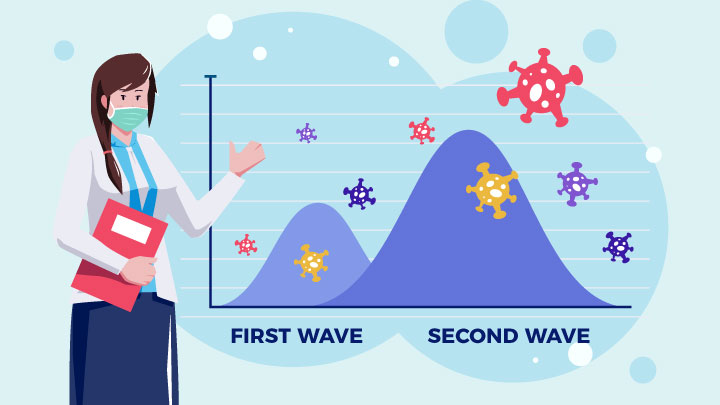

















With the nation recovering from a devastating second wave of the Covid-19 pandemic, there are warnings about an inevitable third wave that might hit us in the near future. But what is a Covid wave and why do these waves happen? Read more to find out.
When referring to a pandemic, the term ‘wave’ is used to identify a rising and falling trend in the number of infections and deaths over a long period of time. Many viral infections occur seasonally, giving rise to alternating periods of high and low infections. When viewed on a timeline, this pattern looks like a series of waves.


Each country, state, district and city will have their own patterns and number of waves, depending on how the infection spreads locally and what measures are put into place to control it.
While the US has had three successively bigger waves till now, India is recovering from its second wave. When comparing states, Delhi has had four waves so far, while the state of Madhya Pradesh has had no sharp peaks until the current wave.
On a national level, India is currently seeing a decline in the number of fresh daily cases, which peaked on 6 May. If the trend continues, it’s expected that by July, the number of active cases in India should reduce to the same number that was reported in February, when the second wave began. If the cases begin increasing again after that, it could mark the beginning of a third wave.
There are a number of reasons why some infections, like Covid, occur in waves.
When the number of cases are surging, authorities implement measures like curfews and lockdowns to limit the movement of people. This causes the rate of increase in the cases to gradually slow down, and is known as ‘flattening the curve’. If these measures aren’t implemented, the rise in the number of patients can quickly overwhelm the healthcare system. And, if these measures are lifted too soon, it can sow the seeds of the next wave.
As the pandemic progresses, when patients recover from the infection, they develop antibodies which prevent them from falling sick from the infection for a short period of time. As more people recover, the virus has fewer people it can infect in that population. This leads to the number of cases decreasing in that area.
Vaccination also allows a similar protection to develop in people who haven’t been infected yet. That’s why authorities across the world are insisting that everyone who can must get vaccinated as soon as possible.
When living organisms reproduce or multiply, there are copying errors in their genetic code that give rise to different versions or variants. Some variants of the virus that emerge may be more deadly, infectious or resistant to treatment than the others. Some may even be unaffected by the vaccines meant to protect against them. These deadlier variants soon become widespread as compared to other variants.
During the course of the pandemic, different variants emerge in different parts of the world and are spread by the movement of people. When a new variant arrives in a particular place, it can lead to an increase in cases there because the population hasn’t developed any resistance to it yet.


Historically, waves in a pandemic are expected to get smaller with time. This is because when the virus first emerges, anyone can get infected and fall sick from it. However, as people recover, a greater number of people develop immunity.
But this pandemic has taught us otherwise, with successive waves in many parts of the world being bigger and deadlier than the ones before. With newer variants emerging as the pandemic rages across the world, we can’t predict when and how severe the next wave will be.
So, we mustn’t be lulled into a false sense of security and let down our guard. We must continue to be cautious, practice Covid-appropriate behaviour, and take the vaccine as soon as we get the chance to do so.
#StayHomeStaySafe